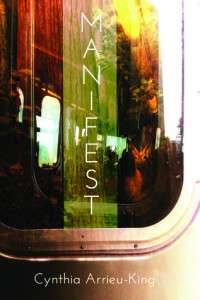Review (from the Women Who Killed It series): MANIFEST by Cynthia Arrieu-King

Our Review Editor Josh English reviews his four favorite books of poetry published this year. These are the Women Who Killed It in 2013.
Review by JOSH ENGLISH
Cynthia Arrieu-King’s second book, Manifest, is broken up into two sections, but across both she employs multipart poems, with each of their sections – generally ten or less lines long – occupying one page. These long poems, especially in the first section, frequently describe a setting or dramatic situation, then dispense with them, favoring instead an emotional development, blurring across boundaries. And although they are often made up of compressed parts, Arrieu-King has an engaging ability to present airy tensions and graceful pressures. This skillfulness amplifies the first sections focus on the foggy and leaping machinations of interiority. In the third section of “Ode to Not Dreaming,” the speaker is piqued by the difficulty of witnessing, and understanding how to witness, war: “what is it about this nightmare that makes me so speechless?”
Then, finding the right distance to stand from an image
to see what face is hidden in its nickel shreds – a step forward,
two steps back – you use restraint for tying nightmare’s hands behind.
Perhaps my favorite poem of the collection is in this first section. The six part poem “Setsuko Hara” imagines the Japanese film star after her withdrawal from public life. The stark sections of this poem document her total isolation and abnegation of her public identity. Whereas in previous poems, the interior operated as an evolving location and method of understanding, for Arrieu-King’s Hara, living exclusively hidden within herself winds up winnowing the self, she hides like, “a black LP played in perpetuity.” Finally, after her admission: “is life disappointing? // Yes,”Hara finds herself vanishing; she remarks: “my face gone among chrysanthemums,” and “Into a kettle’s voice I disappear.” What is absorbing in the Hara of this poem is that her gradually dissolution occurs because the self is such a meagre thing, so pliable and amorphous, and yet the loss of it is a relief, and Hara is, “a smile useless without a face.”
The second half of Manifest deals more directly with tactile reality. These poems continue the earlier project of the problem of multiple interior and exterior selves, but engage with more with location and community, generally urban, than the previous section. These poems are concerned with relationships and identification of home. Arrieu-King has structured her book so that the transition from the increasingly gestural poems of the first section slam against the straightforward (though still richly evocative) poems “Belonging,” and “Manifest.” Both poems are identifiable and sturdy poetic forms – “Belonging,” is a meditation how home and one’s place in it is one that develops over time and how the nature of belonging also changes, so that one is afforded “a for-once / rise-up feeling nothing is missing….” And Manifest is a narrative poem describing the speaker’s mother experience as a child getting locked into the Jardin des Plantes while sketching the sculptured procession of animals onto Noah’s ship. She experiences the panic of abandonment and the shock of wildness in isolation, thinking: “If all these animals come alive, I’ll be dead.” While abrupt transitions in a book’s structure can disorient, the leap from the dreaminess of the first section’s poetics to the more concrete forms of the second works as a study of the exterior whose interior we’d just mined: yes, there is a shock of sunlight, but one gets used to it.
The poem “On the Occasion of Your Lending Me a Shovel,” presents a speaker who talks with a friend, borrows a shovel, hops on the train, sees a hot dude and goes home. But, the emotional undercurrent of the poem punctures through the narrative fabric as the speaker recalls calling the phone company to get a number blocked. She remembers a sadness, likely the result of a fraught relationship, that, “wiped off my kid-face.” Other poems detail the buoyancy of happy relationships. And while the poems of this section are sometimes more conventionally lyrical – like an Olds or Derricotte poem – each bears Arrieu-King’s curious and energetic syntactical stylishness. Immediacy and originality mark every poem, as in this stanza of “Poem to My Younger Self”:
Which first seconds full of cymbals, that clean penny intro,
I wished stretched the whole song
but a ragged voice breaks in
with its finite idea, abrupt into sea swarming like leaves.
The lines also highlight Arrieu-King’s concern with emotional, rather than visual or acoustical, likeness. Notice the charm of her oddly apt description of the cymbals in her first line, and the rupture with sense in the final, the disturbance of the voice’s restriction of the indefinite and the quirky aptness of that final metaphor.
Arrieu-King is one of our most fascinated and confident students of the flux of the undefined because she nowhere attempts to define it. There isn’t a rigid edge to any of these poems, their structures concern the process of thinking and feeling, rather than the desire to identify. These poems are quiet and expansive, curious but unobtrusive. I have trouble describing what kind of poetry Arrie-King writes because each time I start talking about her work I wind up attempting to evaluate and judge – these poems don’t do that. These poems make systems and listen to our apprehensions and understanding while we read.